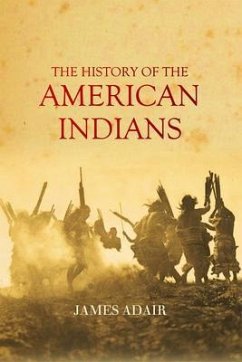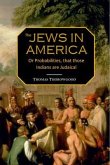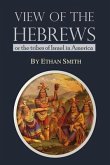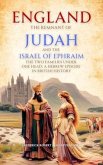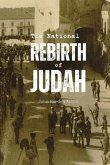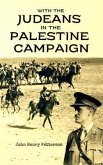"Adair...lived for a time with the Cherokee...had a theory that the American Indians were descendants of the Lost Tribe of Israel...compared Indian ritual and customs with those of the Jews and found a great many similarities." -Knoxville New-Sentinel, Oct.25, 1970
"Very remarkable book 'The History of the American Indians,' written by James Adair and published in 1775." -Nashville Banner, May 18, 1930
"Explorer, doctor, writer, Indian trader...James Adair...was a roaming adventurer...it was his firm belief that the Indian tribes were the descendants of the ten lost tribes of Israel." -The Robesonian (Lumberton, N.C.), Feb. 26, 1951
"H.H. Bancroft in the fifth volume of his Native Races quotes from James Adair on the similarity between the habits, customs and ceremonies of the Hebrews and the American Indians." -Deseret News, Oct. 29, 1927
It is impossible for the religious man not to take particular interest in the history of the Hebrews. The idea of tracing to America the long lost tribes of Israel has risen before the imagination of many and became a favorite theory with the early Spanish priests settled in America.
Among the early authorities contending that the American Indians are descendants from the Israelites, James Adair seems to be the principal one, and since his time, all writers who have favored his views, refer with unreserved confidence to the evidence furnished by him.
James Adair (c.1709-1783), a man of established character, lived as a trader among the Indians, in the south of North America, for forty years. He left them and returned to England in 1774, and there in 1775 published his "History of the American Indians;" which includes his reasons for being persuaded that Indians are the lost ten tribes of Israel.
According to Adair the ten tribes, soon after their banishment from the land of Israel, left Media, and reached this continent from the north-west, probably before the carrying away of the Jews to Babylon.
Adair points out various customs of the Indians having a striking resemblance to those of the Jews; and the great object of his work appears to be to prove that the aborigines of America are descended from that race. The evidence cited by Adair includes 23 similarities
From 1735 Adair resided for 40 years with American Indians particularly nations adjoining to the Missisippi, East and West Florida, Georgia, South and North Carolina, and Virginia, including Katahba, Cheerake, Muskohge, Choktah, and Chikkasah Nations. During this time he was almost entirely cut off from the outside world. From 1744 he resided chiefly among the Chickasaw. In 1751, Adair moved to Laurens County, South Carolina.
While the first part of Adair's book covers his arguments regarding Indians' Hebrew lineage, the second half of the book is more strictly an account of the "Katahba, Cheerake, Muskohge, Choktah, and Chikkasah Nations". The value of Adair's work as showing the relations between the Indians and the English traders was recognised.
"Very remarkable book 'The History of the American Indians,' written by James Adair and published in 1775." -Nashville Banner, May 18, 1930
"Explorer, doctor, writer, Indian trader...James Adair...was a roaming adventurer...it was his firm belief that the Indian tribes were the descendants of the ten lost tribes of Israel." -The Robesonian (Lumberton, N.C.), Feb. 26, 1951
"H.H. Bancroft in the fifth volume of his Native Races quotes from James Adair on the similarity between the habits, customs and ceremonies of the Hebrews and the American Indians." -Deseret News, Oct. 29, 1927
It is impossible for the religious man not to take particular interest in the history of the Hebrews. The idea of tracing to America the long lost tribes of Israel has risen before the imagination of many and became a favorite theory with the early Spanish priests settled in America.
Among the early authorities contending that the American Indians are descendants from the Israelites, James Adair seems to be the principal one, and since his time, all writers who have favored his views, refer with unreserved confidence to the evidence furnished by him.
James Adair (c.1709-1783), a man of established character, lived as a trader among the Indians, in the south of North America, for forty years. He left them and returned to England in 1774, and there in 1775 published his "History of the American Indians;" which includes his reasons for being persuaded that Indians are the lost ten tribes of Israel.
According to Adair the ten tribes, soon after their banishment from the land of Israel, left Media, and reached this continent from the north-west, probably before the carrying away of the Jews to Babylon.
Adair points out various customs of the Indians having a striking resemblance to those of the Jews; and the great object of his work appears to be to prove that the aborigines of America are descended from that race. The evidence cited by Adair includes 23 similarities
From 1735 Adair resided for 40 years with American Indians particularly nations adjoining to the Missisippi, East and West Florida, Georgia, South and North Carolina, and Virginia, including Katahba, Cheerake, Muskohge, Choktah, and Chikkasah Nations. During this time he was almost entirely cut off from the outside world. From 1744 he resided chiefly among the Chickasaw. In 1751, Adair moved to Laurens County, South Carolina.
While the first part of Adair's book covers his arguments regarding Indians' Hebrew lineage, the second half of the book is more strictly an account of the "Katahba, Cheerake, Muskohge, Choktah, and Chikkasah Nations". The value of Adair's work as showing the relations between the Indians and the English traders was recognised.
Dieser Download kann aus rechtlichen Gründen nur mit Rechnungsadresse in A, D ausgeliefert werden.

